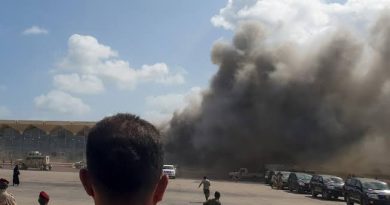Russia masses more troops near Ukraine, U.S. says
Moscow (Reuters) – Russia is now massing yet more troops near Ukraine and an invasion could come at any time, perhaps before the end of this month’s Winter Olympics, U.S. Secretary of State Antony Blinken said on Friday.
Commercial satellite images published by a private U.S. company showed new Russian military deployments at several locations near Ukraine.
In his starkest warning yet to Americans in Ukraine to get out now, President Joe Biden said he would not send troops to rescue U.S. citizens in the event of a Russian assault.
“Things could go crazy quickly,” Biden told NBC News.
Blinken, visiting Australia, told a news conference: “We’re in a window when an invasion could begin at any time, and to be clear, that includes during the Olympics.”
The Beijing games end on Feb. 20.
“Simply put, we continue to see very troubling signs of Russian escalation, including new forces arriving at the Ukrainian border,” Blinken said.
Russia has already massed more than 100,000 troops near Ukraine, and this week it launched joint military exercises in neighbouring Belarus and naval drills in the Black Sea.
Moscow denies plans to invade Ukraine, but says it could take unspecified “military-technical” action unless a series of demands are met, including promises from NATO never to admit Ukraine and to withdraw forces from Eastern Europe.
Several Western countries launched diplomatic pushes this week to persuade Russia to back down, but Moscow brushed them off, yielding no concessions to French President Emmanuel Macron who visited on Monday and openly mocking British Foreign Secretary Liz Truss during a visit on Thursday.
Four-way talks in Berlin between Russia, Ukraine, Germany and France, part of a longstanding peace process in a conflict between Ukraine and Russian-backed separatists, also yielded no progress on Thursday.
Paris said the Russian delegation had agreed to hold more talks but demanded Kyiv negotiate directly with the separatists, a “red line” which Ukraine has rejected since 2014.
U.S.-based Maxar Technologies, which has been tracking the buildup of Russian forces, said images taken on Wednesday and Thursday showed new deployments in several locations in western Russia, Belarus and Crimea, which Russia annexed in 2014.
The images could not be independently verified by Reuters.
In Crimea Maxar identified 550 troop tents and hundreds of vehicles newly deployed at Oktyabrskoye airfield north of the city of Simferopol, as well as deployments near the towns of Novoozernoye and Slavne.
In Belarus it identified a new deployment of troops, military vehicles and helicopters at Zyabrovka airfield near Gomel, less than 25 km (15 miles) from the border with Ukraine. And in western Russia it found a large new deployment of troops and forces at the Kursk training area, approximately 110 km (68 miles) to the east of the Ukrainian border.
Russia has not disclosed how many troops it has deployed and says it has the right to move forces around on its territory as it sees fit. It insists they pose no external threat.
DIALOGUE OF THE DEAF AND MUTE
Western countries have mostly stood together in threatening economic sanctions against Russia if it invades Ukraine, but have given conflicting views on the immediacy of the threat.
The United States and Britain have both warned an invasion could come within days. British Prime Minister Boris Johnson said on Thursday the coming days would be the most dangerous moment in Europe’s biggest security crisis for decades.
France’s Macron, by contrast, has said he thinks Russia does not have designs on Ukraine but wants changes to European security arrangements, and the existing Franco-German-led peace process for Ukraine’s separatist conflict provides a way out.
Whatever its intentions, Moscow has responded dismissively as Western countries have tried to turn up diplomatic pressure.
Pictures of Macron, seated far away from Putin at the opposite end of a huge table in the Kremlin, went viral on the internet this week and were widely mocked. The Kremlin said on Friday the seating was necessary because the French president had refused a COVID-19 test administered by Russian doctors.
French officials said waiting three hours for test results was impossible given Macron’s travel schedule; French sources also said Macron’s office was worried Moscow would sample his DNA.
Britain’s Truss was treated to a public upbraiding at a joint Moscow news conference by Foreign Minister Sergei Lavrov, who described their talks on Thursday as a “conversation between a mute person and a deaf person”.
On Friday, Kremlin spokesman Dmitry Peskov cited a gaffe by Truss, who had to be corrected by her ambassador when she mistook two Russian provinces for parts of Ukraine, as evidence that Western governments were clueless.
“This is the reality in which we have to defend our position,” he said.



